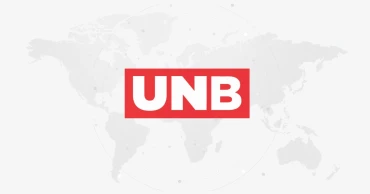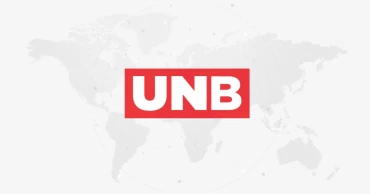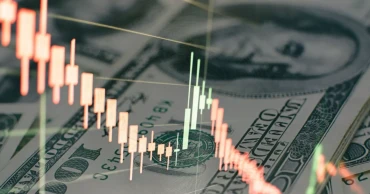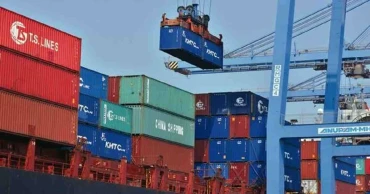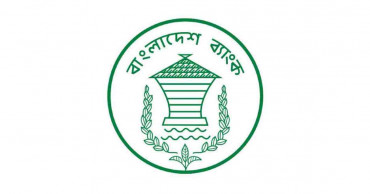export income
Exporters to get slightly higher rate of Tk 102 for one US dollar
Exporters will get Tk102 against a US dollar to repatriate their export income in Bangladesh.
The Association of Bankers Bangladesh (ABB) and Bangladesh Foreign Exchange Dealers’ Association (BAFEDA) announced the new dollar rate for exporters effective Monday.
This is up by one taka from the earlier rate of Tk. 101 per dollar.
Read more: FBCCI seeks dollars from reserves to import commodities for Ramadan
The leaders of ABB and BAFEDA held a meeting on Sunday night to determine the price of the dollar. It decided to increase the rate for export income, but the price of the dollar was kept unchanged in the case of payment of expatriate income and import duties.
As per the new decision, exporters will get Tk1.0 more against each dollar. And in terms of expatriate income, the dollar price has been kept unchanged at Tk 107.
Apart from this, the value of the dollar will be Tk 0.50 more than the average of expatriate and export earnings in terms of payment of import duties.
Read more: Remittance: Bangladesh Bank tells banks to provide Tk 107 per dollar
At present, the price of the dollar in expatriate income is Tk107 and that for export income is Tk102.
As a result, the average of expatriate and export income is Tk104.5. Adding Tk0.50 to this average will be Tk105 per dollar of import bills.
The greenback has been in short supply since March last year following Russia-Ukraine war that jolted global economy.
Read More: No dollar crisis in banks from next month: Salman F Rahman
3 years ago
Bangladesh Bank allows export income, remittance through MFS
Bangladesh Bank has allowed mobile financial service (MFS) providers to repatriate (conversion of foreign currency into local currency) export income and inward remittance.
All authorised dealers will provide encashment certificate to MFS providers against inward remittance, on account of information technology enabled services (ITES) exports.
In order to make it easier to receive foreign exchange, Bangladesh Bank issued a circular stating that all authorised dealers in foreign exchange and all licensed MFS providers are allowed to receive export income on account of ITES exports in association with internationally recognised OPGSPs/digital wallets and/or aggregators having operation in multiple countries.
The Foreign Exchange Policy Department of the central bank issued the notification on Wednesday and sent it to authorised dealers and MFS providers for immediate implementation.
Read more: Towards a cashless society: MFS monthly transactions cross Tk 1.11 lakh crore
The notification said that authorised dealers maintaining settlement accounts will issue encashment certificates in support of inward remittances on request from MFS providers electronically.
In this case, the request needs to be supported by auto-generated information – beneficiary’s name, wallet account number, the amount in taka, date of credit – from a remittance service provider abroad.
Based on their own screening parameters regarding the information, designated authorised dealers shall generate an electronic encashment certificate (as per enclosure A) with QR code accessible to beneficiaries through MFS providers.
Read more: MFS sector led financial transactions during Covid-19 pandemic: Nagad MD
The certificate is intended to be used for income tax purpose only.
3 years ago
Bangladesh’s forex reserves now $34.3 billion, as per IMF formula it’s $26.3 billion
Bangladesh’s foreign exchange reserves is falling due to meeting import demand of essential goods and a downward trend in remittance-export incomes, the latest data of Bangladesh Bank (BB) revealed.
After paying $1.35 billion to Asian Clearing Union (ACU) as an import bill for September-October, and $131 million spent to meet LC liabilities, the forex reserves stood at $34.3 billion at the end of November 7.
BB spokesperson Md Abul Kalam Azad told UNB that the liabilities of import payment are decreasing gradually after reining in opening of import LCs.
Read more: Forex reserves still enough to cover 5 months' imports: PM
US $1.35 billion in ACU bill has been paid in September-October. Earlier, Bangladesh had to pay $1.73 billion for July-August period and $1.96 billion during May-June, he said.
The central banks and the monetary authorities of Bangladesh, Bhutan, India, Iran, Maldives, Myanmar, Nepal, Pakistan and Sri Lanka are currently members of the ACU.
According to the suggestion of International Monetary Fund (IMF), if $8 billion used as export development fund is excluded from the foreign exchange reserves, then the reserves stand at $26.3 billion. It is the lowest in 7 years. Forex reserves were $35.8 billion on October 30, 2022.
Read more: None can chew up forex reserve, it’s for the people: PM Hasina
Bangladesh’s foreign exchange reserves reached an all-time high of $48.06 billion in August 2021 and a record low of $42.5 million in August 1974.
Despite curbing imports, the foreign exchange reserves are falling sharply.
Opening of new LCs has been reduced. But the liability of the previously opened LCs is now payable in terms of arrears or late payment. Due to this, the dollar crisis is becoming more acute.
Read more: What are the 3 reasons behind Bangladesh’s falling forex reserves?
Bangladesh will be able to meet the import expenses of three and a half months with the current forex reserves.
Regarding the tightening of imports, economists said that forex reserves cannot be increased by stopping imports. Domestic products need some imported materials. If not, the economy will be adversely affected.
Former BB governor Dr. Salehuddin Ahmed told UNB that declining reserves are a major challenge for the economy.
Read More: How to safely send remittance to Bangladesh?
“Now we have to think about how to meet this challenge. First, we need to emphasize increasing remittances. Dollar rates should be left to the market,” he said.
Banks in Bangladesh will buy dollars at the required rate. It does not matter whether it is Tk 112 or more. It is important to raise remittance now, former governor of Bangladesh Bank Dr. Salehuddin said.
3 years ago
Target $100 bn export earnings by 2026: Commerce Minister
Commerce Minister Tipu Munshi has said there is no alternative to increasing exports to maintain a strong foundation for the country's economy.
The Government of Bangladesh has therefore set an ambitious target of hitting $80 billion in exports by 2024, and $100 billion by 2026 and is working accordingly, he disclosed.
This would effectively require exports to double in just four years, given that the country's earnings in this sector breached the $50 billion mark for the first time in the recently concluded 2021-22 fiscal.
Read Bangladesh’s apparel export to cross $100 bn by 2030: experts
It can be instructive to note that the doubling from $25 billion to $50 billion took some 11 years - the country earned $25 billion in exports for the first time in 2010-11 fiscal.
Tipu Munshi was speaking as the chief guest at a ‘Meet the Press’ program organised by the Overseas Correspondents Association of Bangladesh (OCAB), held at the Akram Khan Auditorium of the National Press Club on Saturday.
The commerce minister said that Bangladesh will get the currently available facilities and preferences as an LDC till 2029, i.e. for three years after graduation in 2026.
Read Bangladesh’s exports worth $4.60bn in Aug, up by 36.18%: EPB data
“We have to survive in trade competition with the developed countries then, so the government is working to develop the capacity of different sectors along with export diversification,” the minister said. At present, the readymade garments sector alone contributes about 82 percent of total exports.
"So special initiatives have been taken to increase the exports of about 10 sectors including ICT, leather, plastic, light engineering, and jute to achieve the target," he said.
“We have more potential to increase export of readymade garments as Myanmar’s garment sector almost closed and China's garment industry is relocating,” he added.
Also read: Like Singapore, Bangladeshi traders can now buy goods and export directly to third countries
As a result, opportunities have been created for Bangladesh with its huge reserve of 'skilled' - for the RMG sector at least - manpower and low cost of production, mainly due to the cheapest labour money can buy anywhere in the world.
On the other hand, the new generation of factories in the thriving sector has given Bangladesh the highest number of environmentally-friendly 'green factories' in the world, which also keeps the country ahead in trade competition, Tipu said.
“Our trade gap with China and India is highest due to import of industrial machinery and raw materials. China has granted duty-free facilities to 99 percent of its exports to reduce trade barriers. Bangladesh is working towards a SEPA agreement with India to reduce the trade gap," the minister also said.
Also read: Trade deficit in FY 2021-22 is $21,528.74 million: Commerce Minister
In response to a query, Tipu Munshi said that Prime Minister Sheikh Hasina's recent visit to India was successful. India has agreed to provide free transit facilities by road with Bhutan and Nepal.
"There are increasing opportunities for trade and commerce with India by road, sea, and air, communications is improving a lot, 7 agreements have been signed in this tour. By which both Bangladesh and India will benefit a lot.” He added.
Convener of Overseas Correspondents Kadir Kallol, Member-Secretary Nazrul Islam Mithu, and UNB editor senior journalists Farid Hossain were present at the function.
Read All export-oriented industries should get equal facilities: Salman F Rahman
3 years ago
Bangladesh Bank extends retention period to 30 days for repatriating export income
Bangladesh Bank has extended the retention (holding) period to 30 days for repatriating export income in foreign currency, to make transactions more flexible.
Foreign Exchange Policy Department of Bangladesh Bank issued a notification in this regard today (September 6, 2022) and sent it to Authorized Dealers (ADs) bank for immediate effect.
The notification stated that to make trade transactions flexible, it has been decided to extend the retention time to 30 days, from 15, for utilization of the fund to settle import liabilities of relevant exporters.
Read: Social stability now economy’s main challenge: Planning Minister
The fund may also be transferred to other ADs, within this prescribed time of 30 days, for settlement of import payments and/or EDF liabilities against admissible bulk imports of relevant exporters, the Bangladesh Bank circular said.
It means, henceforth the exporting individual or organization will be able to hold dollars for up to 30 days, with which back-to-back letters of credit (LCs), other EDF and import liabilities can be settled.
At the same time, the saved income can be transferred to another bank.
Read How to safely send remittance to Bangladesh?
Before transferring funds, ADs need to satisfy their payment obligations by documentary evidence. ADs transferring the fund will make foreign exchange available to relevant ADs through foreign currency clearing accounts maintained with Bangladesh Bank.
3 years ago
